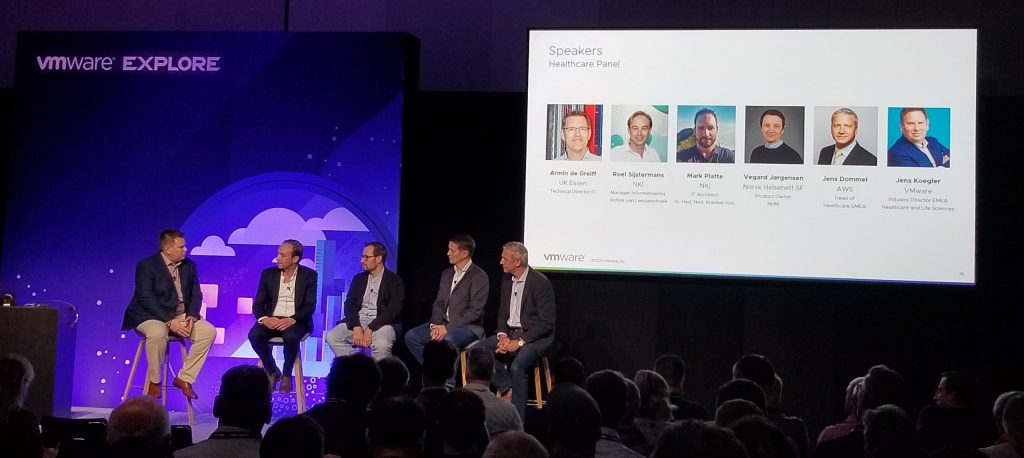Originally published on Jan, 17th 2022 on VMware EMEA Blog
by Jens Koegler | EMEA Healthcare Industry Director, VMware

Irrespective of what sector you work in, if you Google ‘the future of…’ the search returns all manner of exciting developments – some more close to reality than others.
Only in healthcare, that’s not what I’m hearing in daily conversations with most of our customers. What they’re telling me is that they simply don’t have time for these potential projects. That the promise of innovation is a mirage unlikely to be realised on account of legacy, technical debt and complexity. Little wonder ‘The future of healthcare was yesterday’ was one of our most highly attended and hotly debated sessions at VMware Explore.
Mind the gap
The results of some fairly rudimentary audience participation were stark. I asked a room full (almost 200) of senior healthcare practitioners about the time they have for innovation. The consensus was that today, around 30% of their time is available for this with the remaining 70% for dealing with legacy systems and managing the status quo. I also asked how much time they would like. The results were completely flipped with the room ideally wanting 30% to deal with the challenges and 70% of the time to innovate on the basis that an increased time in the latter will help solve the former.
The gap was clear. The challenge – and focus of this session – was how it can be bridged. What can healthcare workers do to be ready for innovation? To create an environment to be agile enough to capitalise on change and to leverage modern IT to free time and develop new ideas to improve outcomes for patients. We asked some leading names in healthcare for their views:
The Fab Four of Healthcare

Armin de Greiff, technical director IT, University Hospital, Essen talked about the sheer number of issues that hospitals need to address, particularly with data and interoperability. He coined it fighting fire with FHIR (Fast Healthcare Interoperability Resources) and would like to see a future where different hospital systems can use the same standards and formats to process data, all talking the same language and being able to interconnect and share information.
“My vision of the future is that all systems communicate with each other as standard. Whether that’s a federated or concentrated platform, I don’t care, but I want us all to be able to aggregate innovation and it be held in a repository we can safely access.”
Armin de Greiff, technical director IT, University Hospital, Essen
Roel Sijstermans, CIO, NKI pointed out that his institution now has 5-6 petabytes of data stored and being used for both clinical and research purposes. While it is shared and delivers exceptional results, he can see much greater potential as he stressed the importance of breaking silos and bringing data into one large data lake to connect different parts of the hospitals and other clinicians.
“We want to create one central source of truth of all data types and connect our systems in real time and have a platform where all the data is combined and is curated”
Roel Sijstermans, CIO, NKI
We also heard from Vegard Jorgensen, Norsk Healthcare Network who spent time explaining a project which he is involved in. It has created one digital foundation for four healthcare regions in Norway to interconnect and share the same information with automated processes. The project has enabled users to set up their own IT services and processes for access but has also helped with national resiliency. If there is a period of time where internet connection is unstable, his team can still deliver and provide care where it is needed.
“We must deliver the critical services that are vital to our customers – no matter what. That’s how we should think, when we are designing systems.”
Vegard Jorgensen, Norsk Healthcare Network
Finally, Jens Dommel, Head of healthcare EMEA, AWS took to the stage. He focused on the importance of public cloud and general cloud adoption in healthcare to offer a personalised health journey and create better patient experiences. This is an area being driven by patients and relies on migrating applications into the cloud to be more cost efficient, secure and reliable.
“We got a call from the Indian government during covid who asked if we could help with a telecom consultation service. We built it with a partner in 24 days. Now they’re running the service with 300,000 tele consultations per day.”
Jens Dommel, Head of healthcare EMEA, AWS

Common challenges
We closed the session with a short panel and audience Q&A, which touched on some of the challenges all of our speakers, and the wider industry, are facing. The biggest being data sharing and legacy. Gaia-X & Health data hubs in countries like France and Germany were cited as examples as ideas to help address this though everybody agreed this is the main barrier to innovation.
Working closely with developers was also a theme, particularly when it comes to delivering fit-for-purpose applications. The panelists agreed that being able to combine the knowledge of clinicians with the developer teams as well as those with a knowledge of infrastructure is critical and a key measure of any future success.
Better results, way faster
I’ll leave the last word on this session to Mark Platte, architect, NKI. When asked by a member of the audience how best to approach adopting AI in a healthcare environment – we’ve all got to take the first step. He said:
“Start small, do your research and even use a separate machine. Keep doing small tests and, as soon as you see that it’s working you can expand your data to scale and start working from there. This way, you’ll get way better results and probably way faster than any other route.”
Mark Platte, architect, NKI
You can watch all of ‘The future of healthcare was yesterday’ session, as well as all the other VMware Explore content. Similarly, if the issues touched on in this blog are familiar to you and you need help starting your healthcare IT journey, please get in touch with me at vmcare@vmware.com
Social Kit

- What we’re hearing in daily conversations with our customers is that the promise of innovation in healthcare is a mirage unlikely to be realised on account of legacy, technical debt and complexity
- What can healthcare workers do to be agile enough to capitalise on change and to leverage modern IT to free time and develop new ideas to improve outcomes for patients?
- Introducing the Fab Four of Healthcare
Facebook/LinkedIn
- Irrespective of what sector you work in, if you Google ‘the future of…’ the search returns all manner of exciting developments – some more close to reality than others. Only in healthcare, that’s not what I’m hearing in daily conversations with most of our customers. What they’re telling me is that they simply don’t have time for these potential projects. That the promise of innovation is a mirage unlikely to be realised on account of legacy, technical debt and complexity
VMware Blog Page:
https://blogs.vmware.com/emea-en/2023/01/the-future-of-healthcare-was-yesterday/








